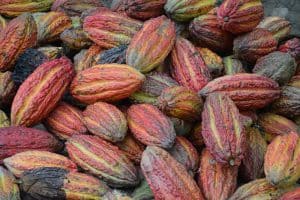Cocoa is safe to consume in pregnancy and during breastfeeding and does not have adverse effects on the baby when consumed in moderation. In fact research suggests that drinking a cup of hot cocoa may have numerous health benefits.
Cocoa comes from the Spanish word Cacau or ‘the food of the gods’ and has been around for over 4000 years. It is a rich source of magnesium, flavonoids and theobromine. What this means for an expecting mother is that her favourite beverage is just what the doctor ordered. The theobromine present in cocoa counters pre-eclampsia. The flavonoids loaded with antioxidants boost her immunity. It is good for her heart, regulates her cholesterol levels, and releases serotonin and endorphins in her brain enhancing her mood and relieves stress. One Swedish study goes so far as to say that expecting mothers who consume cocoa regularly during pregnancy have happier, more lively babies.
Cocoa is available in many forms. Bitter chocolate, sweet chocolate, cocoa powder and white chocolate. Bitter chocolate is made from cocoa seeds (kernels), while cocoa powder is obtained from cocoa butter. Sweet chocolate is made by adding vanilla and sugar to bitter chocolate. White chocolate is produced by mixing sugar, cocoa butter and milk solids together.
But consuming cocoa in large quantities during pregnancy is not advisable for two important reasons: first, chocolate or cocoa is full of calories and no expecting mother wants to gain more weight than necessary. Also, it will make you feel full and leave no room for healthy foods to be consumed. Secondly, cocoa contains caffeine. When a pregnant lady consumes more than 200 – 350 gm of caffeine per day, the caffeine penetrates her placenta and enters the baby’s bloodstream. As the baby is unable to break it down, it remains there for an extended period of time. This elevates the baby’s heart beat and affects its movement within the uterus. Caffeine also interferes with the absorption of calcium and iron in a pregnant woman, affecting her baby’s overall development. Excess consumption of caffeine also puts the mother at risk of preterm delivery, low birth weight and miscarriage.
That’s why The American College of Obstetricians and Gynecologists recommend that pregnant women keep their caffeine intake well below 200 milligrams (mg) each day. That means you can have one cup of hot cocoa or two squares of a chocolate bar or an occasional small serving of chocolate cake. The darker the chocolate the better. Some chocolate enthusiasts swear by the health benefits of raw cacao seeds and proclaim that the amount of caffeine in a 40-gm bar of dark chocolate made of raw cacao seeds contains less caffeine than one cup of decaffeinated coffee. But always consult your doctor before consuming cocoa in any form or adding it to any recipes.






